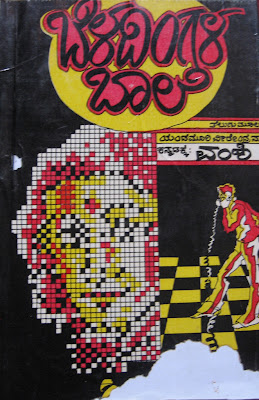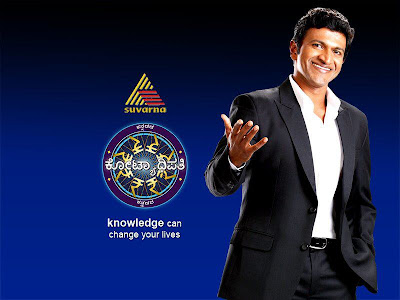Beladingala Baale is one my favourite films. I was thinking of blogging about this movie for a long time. After I read the novel based on which the film is made, I had enough material to talk about the epochal movie.
The Movie: The movie is based on original Telugu novel -
Vennelalo Aadapilla by Yandamoori Veerendranath. This was translated to Kannada by Vamshi as
Beladingala Baale, which later was made into film. Incidentally, Vamshi also wrote dialogues for the movie or rather dialogues from the novel are adapted in the film without any modifications.
Beladingala Baale literally means "lady in the moonlight". Story revolves around Revanth(played by Ananth Nag), a grandmaster who is set to find out the identity of his fan who calls him often and whom he refers to as
beladingala baale.
Beladingala Baale gives Revanth the clues to find her out. How Revanth accomplishes his task forms the gist of the movie.
Original Novel : I was looking for the novel in Kannada based on which the movie is made. Thanks to my friend Guru, I got hold of the book from an old books store. The novel was published in the year 1984. I also found out that the novel was serialized in Kannada magazine
Sudha then.
More about Chess : If you are not devout follower of Chess, while reading the novel you will come to know many fascinating aspects about the game originated in India. One of the highlights of the movie is the blind fold chess game protagonist Revanth plays. Before this he is accused of hypnotizing his opponent. The book provides the background for this plot(In 1978, Anatoly Karpov was accused of hypnotizing his opponent Viktor Korchnoi in the game at Baguio in the Philippines). Also, if the game is extended to the next day, what ensures that the opponent does not get an overnight for thinking about his next move. One has to make 16 moves within an hour of his play else he will loose the game(with the time being counted by the stop clocks provided to both the players)
Working in Telephone Exchange : The book discusses about the problems women working at the telephone exchange had to face(though the scenarios here are from the 1980s) You will not find anything about this in the movie. Also, you will come to know about several terminologies used in the telephone sector, which now may have become obsolete.
I ate nothing for six ghante kaala : This is the clue provided to Revanth to find the telephone number of his secret fan and is used several times in the film. But the movie does not explain the logic behind this clue but you will find it in the Yandamoori's novel.
Mathematical Details : Many mathematical details in the novel are missing in the film. That is understandable as the film caters to variety of audience. Clue with which Revanth finds about the whereabouts of the mystery girl has its routes in Pythogoras theorem. Also, while finding her name, which is Ramya, Revanth uses his knowledge of permutations and combinations. You will come across such mathematical backgrounds for the puzzles posed by the mystery girl. Though at times, you feel like being a grand master Revanth could have solved the puzzles, we can give the creative liberty to the author.
Voice : Throughout the movie, though the heroine's face is not revealed, her voice echoes in the minds of the viewers. Guess who lended the voice? Manjula Gururaj - background singer of many popular Kannada film songs.
Miscellaneous : There is a scene involving a Marxist in the movie, which is used as an irony in the novel. Revanth's friend James, a cartoonist is an unusual character in the
movie. Why he behaves the way he does has deeper psychological
background in the novel. I am OK, You are OK - philosophy in the film is explained by American psychiatrist
Thomas Anthony Harris in his 1969 book -
I am OK, You're OK.
Hope you enjoy the post!




